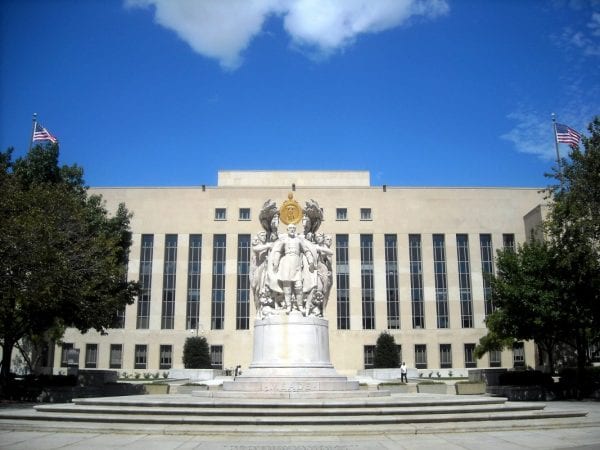
Net Neutrality Heads to Court as Verizon Takes on FCC & Internet Regulation
Taxpayers Protection Alliance
September 17, 2013

US Court of Appeals, DC Circuit (courtesy Wikipedia)
Last week, the United States Court of Appeals for the District of Columbia Circuit heard oral arguments in a case that has Verizon taking on the Federal Communication Commission (FCC) in a battle over regulations and the Internet, aka Net Neutrality. Verizon, one of the nation’s largest Internet Service Providers (ISPs), will make their case to the appellate court for the right to charge fees to content providers who are willing to pay to have their data transported faster to customers. While the FCC contends that Verizon and other ISPs must provide content freely so that all have an equal ability to reach consumers, the critical issue is whether or not Verizon has the ability to manage its network to provide the best possible service for its customers.
The Taxpayers Protection Alliance (TPA) has been no stranger to this debate and the warning signs have been clear for a potential power grab from the FCC. “Net neutrality,” which is loosely defined as a system that allows information on the Internet to move freely without regard to content is in reality, a not so subtle attempt to regulate the Internet. The truth is that the Internet has thrived because government has, up until now, kept a light regulatory touch on the Internet. Quick reacting business and free market forces have kept the Internet thriving, slow unresponsive government bureaucracies would certainly have an adverse impact on the quality of service and capabilities available to consumers and businesses who depend on the Internet in their everyday lives. A new regulatory regime for the Internet will stifle innovation and cost taxpayers millions of dollars in a newly created, and unwarranted bureaucracy.
Discussing the case, the possibilities of how the court may rule and what the ramifications would be for those possible rulings, Wayne Crews of the Competitive Enterprise Institute writes in Forbes that:
“The philosophy is fundamentally hostile to property rights in infrastructure, and in turn, hostile to consumer welfare… If investors can’t “own” their pipes or spectrum, networks can’t achieve their potential. If private ownership rights are taboo simply because property is long and thin (or intangible like spectrum), governments, commissions or heavily regulated utilities will dominate infrastructure rollout, and over-police it.”
Over the last few years the efforts by the FCC to administer net neutrality were closely monitored by TPA, and with this case there is a real possibility that net neutrality regulations could be scrapped if the court rules in favor of Verizon. If that happens, it could mean a whole new challenge to the FCC’s power to regulate the Internet. With a new chairman and the real possibility of new legal defeats, this could be a momentous shift in power against government regulators. Though the ruling on this case will not be handed down for several months, the implications could not be clearer. Scott Cleland, the chairman of NetCompetition, said of the case, “This will determine whether the laws and regulations of the past — the pre-Internet age — will apply to the Internet’s future. It will determine the regulatory power and authority of the F.C.C. in the 21st century.”
